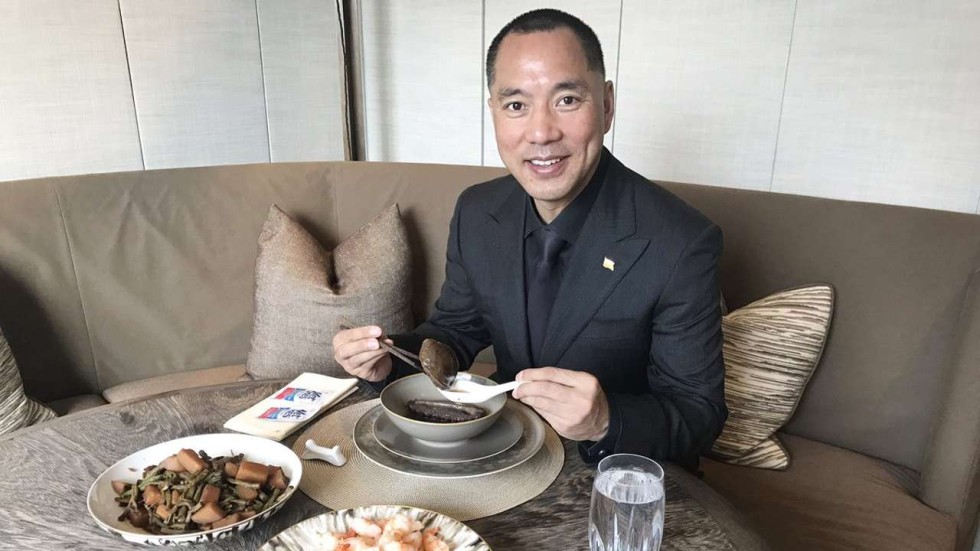If you missed the latest billionaire scandal in China, you could be forgiven.
The case of Guo Wengui, also known as Miles Kwok, the billionaire property developer of Beijing Zenith Holdings, has mostly been carried out in Chinese language sites and through Beijing's propaganda machine.
The only people to make sense of the disparate stories are keen observers of elite Chinese politics. Those include the English language newsletter writer Bill Bishop, who has chronicled the case over the last two days, and New York Times reporter Michael Forsythe.
Here's what is clear.
The case of Guo Wengui, also known as Miles Kwok, the billionaire property developer of Beijing Zenith Holdings, has mostly been carried out in Chinese language sites and through Beijing's propaganda machine.
The only people to make sense of the disparate stories are keen observers of elite Chinese politics. Those include the English language newsletter writer Bill Bishop, who has chronicled the case over the last two days, and New York Times reporter Michael Forsythe.
Here's what is clear.
It is always dangerous to be a billionaire in China, especially one in real estate.
Local governments control the land, and graft almost always lurks behind the deals that turn real estate from public to private.
Guo made his money through real estate.
Guo made his money through real estate.
He's lobbed corruption accusations at China's most powerful, and the government has returned the insults.
This week China succeeded in getting Interpol to call for Guo's arrest.
The latest episode is a growing embarrassment for the Communist Party particularly because it questions whether Xi Jinping's anti-corruption campaign can truly take on the China Communist Party's endemic corruption.
The latest episode is a growing embarrassment for the Communist Party particularly because it questions whether Xi Jinping's anti-corruption campaign can truly take on the China Communist Party's endemic corruption.
Guo's accusations of corruption climb to the highest level of Chinese politics.
Here's the basic rundown:
After accusing officials of corruption throughout his career—according to investigative reports in Chinese media—Guo has recently taken on a deputy minister of Public Security.
Here's the basic rundown:
After accusing officials of corruption throughout his career—according to investigative reports in Chinese media—Guo has recently taken on a deputy minister of Public Security.
Guo was scheduled to give a three-hour interview to Voice of America on Wednesday, during which he promised "a nuclear bomb of corruption allegations.”
But after an hour, the interview abruptly stopped.
But after an hour, the interview abruptly stopped.
Chinese officials pressured Voice of America to cancel the interview, an official with the broadcaster told the New York Times.
Guo's staged his latest interviews from the U.S., where he arrived in 2015, reportedly after his ally, former spy chief Ma Jian, was detained in an anti-corruption case.
Guo's staged his latest interviews from the U.S., where he arrived in 2015, reportedly after his ally, former spy chief Ma Jian, was detained in an anti-corruption case.
In the U.S. he has joined Trump's Palm Beach Mar-a-Lago resort, a fact that could ratchet up China-U.S. diplomatic intrigue in his case.
Since then, Beijing has staged a counter attack.
Since then, Beijing has staged a counter attack.
Stories discrediting Guo have flowed from Chinese state media outlets this week.
What follows now is unclear.
Guo appears to remain safe in the U.S. to send more accusations of corruption at Chinese officials, unlike Xiao Jianhua, a billionaire abducted by Chinese state security from Hong Kong across the Chinese border earlier this year.
What follows now is unclear.
Guo appears to remain safe in the U.S. to send more accusations of corruption at Chinese officials, unlike Xiao Jianhua, a billionaire abducted by Chinese state security from Hong Kong across the Chinese border earlier this year.
Xiao was known for helping China's powerful move their assets overseas, according to Willy Lam, a professor at Chinese University of Hong Kong.
The latest drama is important in part because it involves high level officials.
The latest drama is important in part because it involves high level officials.
But it is also unfolding a few months before a once-every-five-years leadership change in the ruling Politburo Standing Committee, and it could change the calculus of filling five of the seven opening seats.

Aucun commentaire:
Enregistrer un commentaire